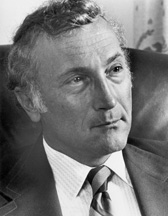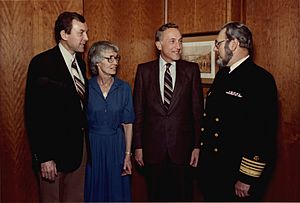Richard Schweiker facts for kids
Quick facts for kids
Richard Schweiker
|
|
|---|---|
 |
|
| 14th United States Secretary of Health and Human Services | |
| In office January 22, 1981 – February 3, 1983 |
|
| President | Ronald Reagan |
| Preceded by | Patricia Roberts Harris |
| Succeeded by | Margaret Heckler |
| United States Senator from Pennsylvania |
|
| In office January 3, 1969 – January 3, 1981 |
|
| Preceded by | Joseph Clark |
| Succeeded by | Arlen Specter |
| Member of the U.S. House of Representatives from Pennsylvania's 13th district |
|
| In office January 3, 1961 – January 3, 1969 |
|
| Preceded by | John Lafore |
| Succeeded by | Lawrence Coughlin |
| Personal details | |
| Born |
Richard Schultz Schweiker
June 1, 1926 Norristown, Pennsylvania, U.S. |
| Died | July 31, 2015 (aged 89) Pomona, New Jersey, U.S. |
| Political party | Republican |
| Spouse |
Claire Coleman
(m. 1955; died 2013) |
| Children | 5 |
| Education |
|
| Military service | |
| Branch/service | |
| Years of service | 1944–1946 |
| Battles/wars | World War II |
Richard Schultz Schweiker (born June 1, 1926 – died July 31, 2015) was an American politician and businessman. He was a member of the Republican Party. He served as the 14th U.S. Secretary of Health and Human Services. This job involves leading the government department that works on health and welfare for Americans. He held this role under President Ronald Reagan from 1981 to 1983. Before that, he was a U.S. Representative (1961–1969) and a U.S. Senator (1969–1981) for Pennsylvania. In 1976, he was Ronald Reagan's choice for running mate (Vice President) when Reagan ran for president.
Contents
Early Life and Education
Richard Schweiker was born in Norristown, Pennsylvania, on June 1, 1926. His father and uncle worked in the tiling business. He was part of a religious group called Schwenckfelders.
He went to public schools in Worcester. He graduated from Norristown Area High School in 1944. He was the valedictorian, which means he was the top student in his graduating class.
During World War II, he served in the U.S. Navy. He worked on an aircraft carrier called the USS Tarawa. He left the Navy in 1946.
After his military service, Schweiker went to Slippery Rock State College. He then transferred to Pennsylvania State University. In 1950, he earned a degree in psychology from Penn State. He then joined his family's business, American Olean Tile Company. He quickly became the company's president.
He also became involved in local Republican politics. He helped start the Montgomery County chapter of the Young Republicans. He was president of this group from 1952 to 1954.
Marriage and Family
On September 10, 1955, Richard Schweiker married Claire Joan Coleman. She used to host a children's television show called Romper Room. They had five children together: two sons and three daughters.
Political Career
Serving in the U.S. House of Representatives
In 1960, Schweiker was elected to the U.S. House of Representatives. A U.S. Representative is a person elected to speak for their district in the U.S. Congress. He represented Pennsylvania's 13th congressional district. This district included his hometown of Norristown. He was known as a moderate to liberal Republican. He won his first election and was re-elected three more times.
While in the House, Schweiker worked on important committees. These included the Armed Services Committee and the Government Operations Committee. He helped pass a law in 1965 that gave cash awards to military members. These awards were for ideas that saved the government money.
He supported important civil rights laws, like the 1964 and 1968 Acts. He also supported the Voting Rights Act of 1965. These laws helped protect the rights of all Americans. He also supported creating Medicare, which helps older Americans with health costs. He also supported increases in Social Security benefits and federal rent subsidies.
Serving in the U.S. Senate
In 1968, Schweiker was elected to the U.S. Senate. A U.S. Senator is a person elected to speak for their entire state in the U.S. Congress. He won by a large number of votes. He was the only Republican to win a statewide election in Pennsylvania that year.
In the Senate, he continued his progressive views. He was against the Vietnam War. He also opposed some of President Richard Nixon's choices for the U.S. Supreme Court. However, he also supported school prayer and was against stricter gun control.
During his time as a Senator, Schweiker was a top Republican on the Labor and Human Resources Committee. He also worked on the committee that decided how much money government agencies like Health and Human Services would get.
Fighting Diabetes
Schweiker was a leader in getting more government money for diabetes mellitus research. He wrote and supported the National Diabetes Mellitus Research and Education Act. This law, passed in 1974, created a special group to make a long-term plan to fight diabetes. His efforts led to more federal money for diabetes programs. People who worked with him sometimes called him the "Patron Saint of the Pancreas."
He was re-elected in 1974. This was a difficult year for many Republicans because of the Watergate scandal. However, Schweiker won with 53% of the vote. He was the first Republican senator in Pennsylvania to be supported by the Pennsylvania AFL–CIO, a large labor union group.
The Church Committee
From 1975 to 1976, Schweiker was part of the Church Committee. This committee was led by Senator Frank Church. Its job was to investigate if U.S. government intelligence agencies, like the CIA and FBI, were doing anything illegal inside the country.
The committee found that some information about past events was not fully shared with earlier investigations. Schweiker believed that the initial investigation into the assassination of President John F. Kennedy was not complete. He said that the committee had found "significant leads" and that the first investigation was like "a house of cards." The Church Committee's final report said the first investigation was not good enough. However, it did not find enough proof to say there was a conspiracy to assassinate President Kennedy.
Vice Presidential Consideration
In 1976, Ronald Reagan was trying to become the Republican candidate for president. Before the 1976 Republican National Convention, Reagan surprised many by saying he would choose Schweiker as his running mate. This was unusual because candidates usually pick a running mate only after they win the nomination. Reagan hoped this would help him get support from more moderate Republicans. However, President Gerald Ford won the nomination instead.
Schweiker was surprised by Reagan's choice, as they did not know each other well. After this, Schweiker's voting record became more conservative.
In 1980, Schweiker decided not to run for re-election to the Senate. Ronald Reagan won the presidential nomination that year. He chose George H. W. Bush as his running mate and won the election.
Health Secretary

In January 1981, President Reagan asked Richard Schweiker to be the U.S. Secretary of Health and Human Services. Schweiker accepted and held this job until February 1983.
In this role, he worked with President Reagan and House Speaker Tip O'Neill to make changes to Social Security. He also focused on preventive medicine, which means stopping diseases before they start. He worked to reduce government spending on Medicare and food stamps. He also tried to make welfare rules stricter. He suggested reducing Social Security benefits for people who retired before age 65, but Congress did not agree with this idea.
Political Legacy
During his time in public service, Schweiker strongly supported a volunteer army. He helped write a book called How to End the Draft. This book became a guide for changing the U.S. military to an all-volunteer force. He also pushed for the Schweiker Act of 1965. This law gave cash awards to military personnel for ideas that saved money. These ideas saved taxpayers more than $1 billion.
As a top Republican on the Senate health subcommittee, Schweiker worked on laws to fight diseases. These included diabetes, cancer, heart disease, sickle cell anemia, and lead paint poisoning. His work on diabetes led to more federal money for diabetes programs. It also helped create a model for how to organize research efforts across different health agencies.
Later Life and Death
From 1983 to 1994, Schweiker was the president of the American Council of Life Insurance. This group is now called the American Council of Life Insurers. After that, he retired and lived in McLean, Virginia.
Richard Schweiker passed away on July 31, 2015. He died from problems caused by an infection at a medical center in Pomona, New Jersey.
See also
- Rockefeller Republican
- List of Pennsylvania State University people
 | Selma Burke |
 | Pauline Powell Burns |
 | Frederick J. Brown |
 | Robert Blackburn |

